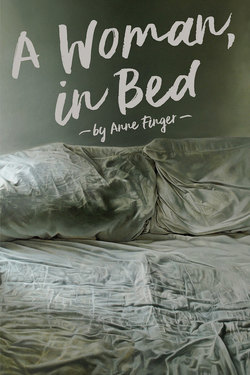Читать книгу A Woman, In Bed - Anne Finger - Страница 11
На сайте Литреса книга снята с продажи.
ОглавлениеHusband
When Simone reached the grove of cypresses, their branches sculpted by the sea winds into long green strands, she seated herself on a flat boulder and pulled the letter from her waistband.
“Thank you for your most recent letter. I wish I could report better news on this front. The delayed railway ties have at last arrived, but are of such inferior quality that a good half of them are unusable. The summer heat is already ferocious—well over 40 degrees many days and has been accompanied by a plague of red chiggers. The natives spend more time scratching themselves than working. I do not mean to burden you with concerns which more properly belong to the masculine realm, but only to underscore that it is quite impossible for me to either come to France or for you to return to Turkey. You must draw of your reserves of inner strength, both for your own well-being and for that of our child.”
She was too shocked to cry.
Her hands formed into fists—Luc would no doubt have chuckled had he seen them—fists as helpless as those of Marcel. In one of these fists was the letter, crumpled into a ball. Until now, she had kept every letter he had written her, tied up with a pale blue ribbon in a packet.
She described Luc as mon mari, but if she knew English that language’s equivalent would strike her as far more apt, with its allied meaning of one who manages a farm: the verb to husband, to govern thriftily and well.
Luc did not love her, she saw that clearly. He loved the idea of her, the image of her in her pale gown, gliding down the stairs, her blonde hair upswept atop her head, with a few errant tendrils tumbling down. He loved her laughter, her charm. He loved the words “my wife,” he liked to escort those words to gatherings, to introduce them to his colleagues and connections. He liked to slip the hand of those words through the crook of his elbow and give them an affectionate pat. (The fault was not entirely on Luc’s side: she had fallen in love not so much with Luc as with his adoration of her.)
The wind made the hairs on her arms stand up on end, while beads of sweat gathered in her pores.
A quarter of an hour later, Marcel had indeed worn himself out with crying and fallen back asleep. M. Dupont had delivered the miller’s bill to the institution, and Albert had just said to Mme. Vidal, who had chided him for arriving unannounced, “Oh, but I wrote you! I’m sure I did.”
“No matter.” Even with the financial assistance given her by her son-in-law, she was not in any position to turn away guests. Moreover, not having seen him since the start of the war, she had assumed him dead. She supposed it about all young men unless she knew otherwise. Easier to jumble all those bones into the mass grave of her imagination than to wonder about each one: Did he survive? Is he staring at the wall in some veterans home in the countryside? Here was one resurrected.
His arrival did mean that she would have to turn her bedroom over to the two young men, sleep in the sitting room.
“Oh, there’s Elise!” Albert cried, recognizing her sky blue frock.
“No. Elise, she…”
“Oh,” Albert said, putting his hand on Mme. Vidal’s shoulder.
“Three years ago…the Spanish,” using the local name for influenza. Mme. Vidal withdrew herself from Albert’s touch, fearing loss of her composure. “That’s Simone.”
In the autumn of 1918, it seemed that death, that old glutton, had finally had his fill, pushed his chair back from the table, patted his rotund belly, lit a cigar, said, “I couldn’t possibly eat one more thing.” But then he caught a smell wafting in from the kitchen. Light and clear, the perfect thing after the meal he’d just devoured, those lads tasting of mud, quite on the gamey side. He cleansed his palate with ruddy-cheeked farm boys too young for the army, their fresh-faced sisters, old women smelling of apple blossom bath powder, barefoot imps with gap-toothed smiles from the slums of Manchester and Berlin and Bombay. How quickly they went down, clean as a fruit sorbet.
Elise came home from a hike one afternoon, her cheeks in high color, sat down, put her hand to her breast, and spoke her last full sentence, “I’m rather flushed.”
Simone had been the one her mother had fretted over: not only too thin, but given to bouts of melancholy and novel-reading. Consumption seemed inevitable. A cough caused her mother to banish her to the sleeping porch so that the winds could carry the tubercle bacilli away. Simone’s good health did not prove her mother wrong: quite the contrary, it was evidence that Mme. Vidal’s methods had been successful.
Mme. Vidal swiped her hands against each other, shaking off the dust of the past. “Yes, yes, and Simone is now married woman.” As if on cue, Marcel began to wail. “And I am now a grandmama. Walk up to meet her, Cecile can see to your things.”
